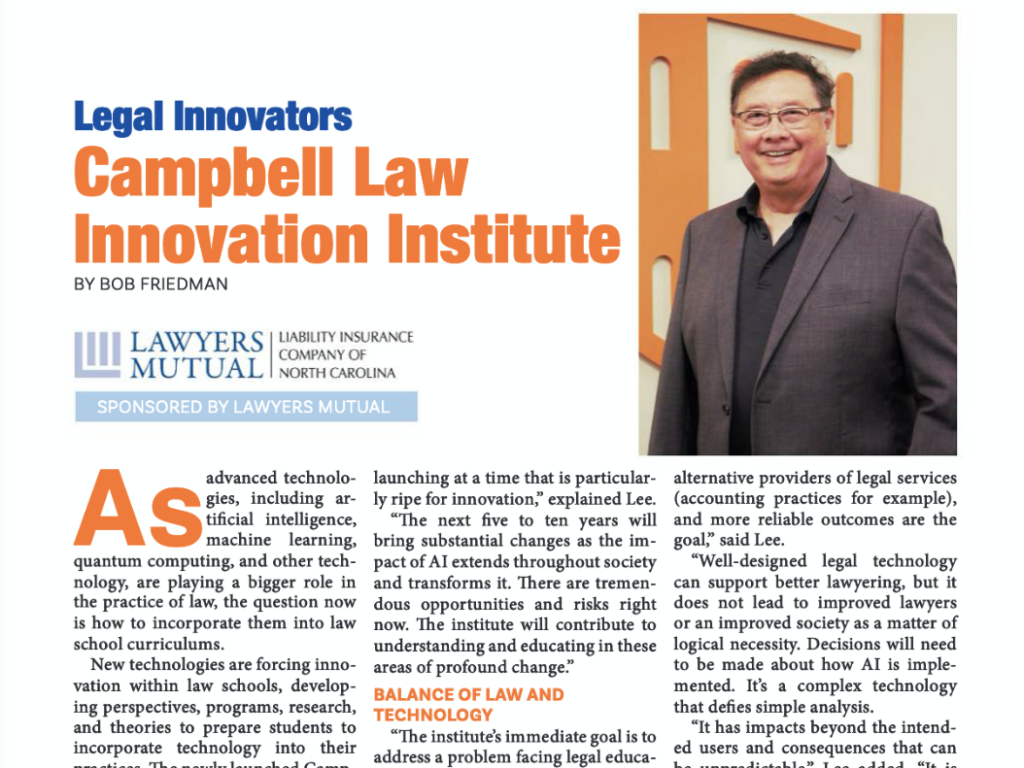Professor Kevin Lee, director of CLII, talks with Attorney at Law Magazine

Kevin Lee, the director of the new Campbell Law Innovation Institute (CLII), recently sat down with Attorney at Law Magazine to discuss legal technology, AI ethics and his vision for the Institute. Lee, who is a tenured professor with more than 30 published papers in legal philosophy, professionalism and legal technology, explains that contemporary computation creates challenges and opportunities for lawyers and other legal service professionals.
For the past five or six years, there has been a growing awareness among lawyers of the presence of legal technology. A few years ago, it was led by the hype surrounding blockchain and continued with the AI hype. All the attention led to overly optimistic claims about how legal technology is going to revolutionize the practice of law and extend legal services to people and places that are chronically underserved. All of this is good, of course. Teaching the community about legal technology is a central goal for the Institute. “There are multiple constituencies for this,” Lee says. “It’s about teaching lawyers, but also clients and the public at large. Everyone needs to understand the new technology because it will shape their relationship to law and, ultimately, their ability to live effectively in a technology-driven legal system.”
While Lee is optimistic about what a technology-driven legal system might be like, he cautions that legal technology won’t necessarily make for a better legal system or a better society. He explains that “decisions will have to be made about how it is implemented.” Like any advanced technology, “legal tech can have unexpected consequences for people who were never intended to be influenced by it.” He thinks these unintended consequences could be very difficult for lawyers to anticipate, and that leads to questions about the future of the legal profession. “It has always been a self-regulating profession, but there is no reason to believe that it will be in the future, particularly if lawyers don’t fully understand consequences of the technology they are using.”
The Campbell Law Innovation Institute will study the development of legal technology and its relation to AI ethics. Lee explains that its goal is to bring some much-need perspective to legal technology, which is advanced by enthusiasts who rarely seems to question its significance for the social and political ethics of society that it is helping to create. The goals of most innovation projects at law schools have been directed either towards commercializing legal technology, or to studying the impact it might have on individual rights. Little attention, right now, has been given to the well-being of society.
“It is just assumed that it will be good for society,” Lee says. “We probably could have some better thinking about what computational techniques in law tell us about the nature of law and where a technology driven legal services industry might be taking us.” But, he says, technologists and lawyers really don’t have the background to assess the complex issues that can help to predict how a technology will impact the well-being of society. “It’s about more than just protecting individual rights,” he explains. “It’s also about promoting the moral values that support a free people and a robust democracy.”
Political theory, philosophical ethics, social science and other fields are going to be needed too, he explains. “We need to think of legal technology as assemblage of deterministic and stochastic processes that will impact the quality of our democracy, the strength of the rule of law, and ultimately the well-being of everyone.” Lee believes that leadership in this area should be driven by people with sound education in social and political ethics, AI ethics and contemporary legal philosophy. “It is a situation similar to the development of medical ethics,” he says. “That was led by philosophers, and philosophers are needed here too.” But, he points out, doctors are better trained than lawyers. “They have scientific knowledge of how the body works for the well-being of the patient.” Lee says, “Most lawyers know almost nothing about the social science or the philosophical issues at stake in legal technology. They are fairly anti-intellectual and captured by an ideological view of law, capitalism and neoliberal values that is increasingly difficult to maintain.”
Lee, who teaches courses on the integration of legal philosophy, ethics and technology, notes that “Questions about the moral meaning of technology are ancient, of course.” One finds in the Greek mythologies of Promethium and Orpheus two basic orientations–a conflict of sorts–between technology as a stolen gift from jealous gods. Or is it a gift given freely to people who, in their admiration of it, use it foolishly?” These are important perspectives, but mostly they are lost in a mad rush for profits and the goals of representing clients. “Lawyers, however, are always public-citizens with obligations to the public good,” Lee says. “When lawyers cease to honor that goal, the profession no longer deserves to self-regulate. It becomes a business like any other and should be regulated externally.”
Lee envisions the Innovation Institute as a place to study the new technology and to learn how to assess its moral meaning for a rapidly evolving society. You can read his interview with Attorney at Law Magazine here.
